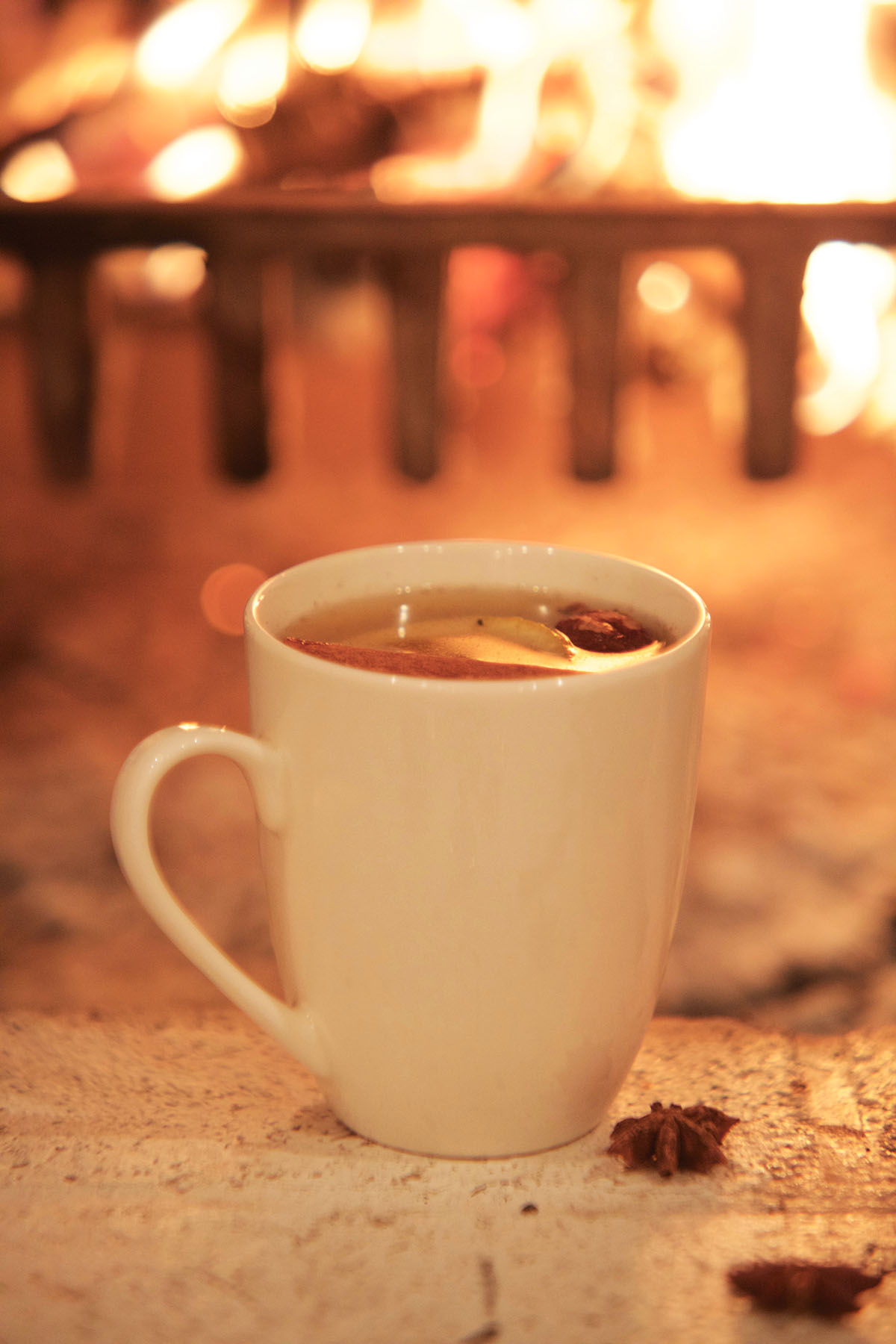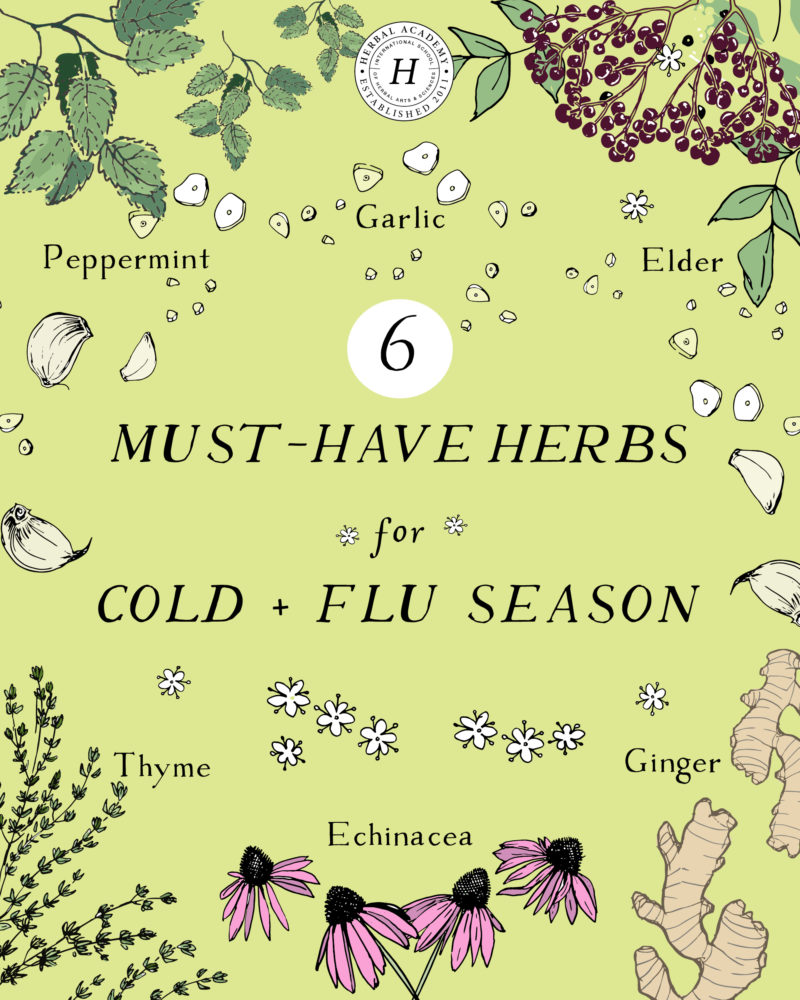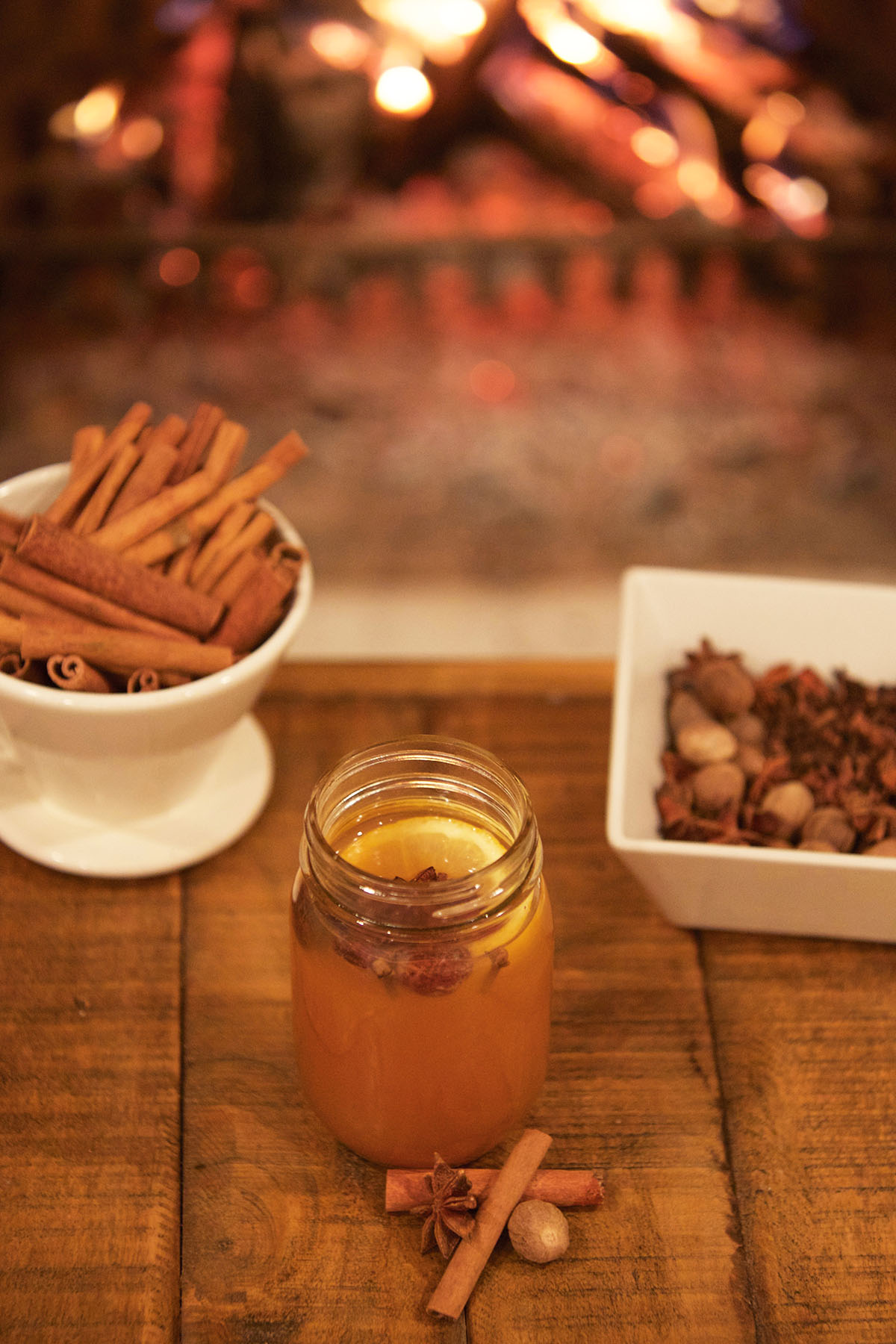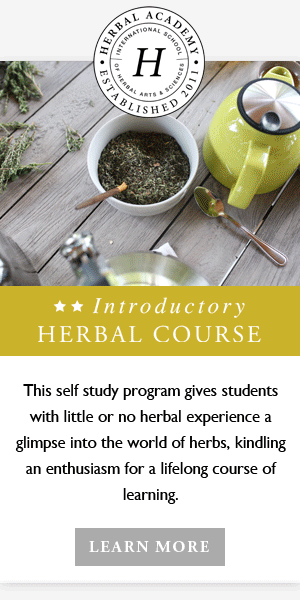
Tips For Staying Healthy This Cold And Flu Season
As cold weather arrives, cold and flu virus infections begin to increase in number. Have you thought about what you will do to support your body during cold and flu season? Will you get a flu shot? Will you incorporate herbs into your daily health regimen?
Cold and flu viruses are infections spread by mucus droplets in the air, on doorknobs, elevator buttons, handrails; anything the droplets land on is a potential infection spreader!
History of the “Flu”
In a typical year, the flu virus (influenza) goes around the world once a season. During the 1918 pandemic, however, it is believed that it spread around the world three times, changing and getting stronger each time (Latson, 2015). The 1918 pandemic caused between 20-50 million deaths worldwide (History.com, 2010). In an average year, tens of thousands of people die from the flu in the United States (NPR, 2010).
Are You At Risk?
Persons most at risk for influenza infections are those over the age of 65, children and babies, those in poor health or who have chronic health conditions or suppressed immune systems, those who are obese, pregnant women, those living in close living quarters (CDC, 2016), or those with poor nutrition.
Preventative Measures for the Cold and Flu Virus

There are many ways you can work to prevent catching a virus during cold and flu season. While some of these do involve the usage of herbs, other practices such as good hygiene, good nutrition, lifestyle considerations, and sleep habits can make a big difference as well.
Good Hygiene:
- Regularly wash your hands with soap.
- Avoid crowds, pens and pencils in public places, and shopping carts. (Cold and flu season is a good time to start carrying your own pen.)
- Don’t touch your face. Viruses enter the body thru mucous membranes, so keep your hands away from your mouth, nose, and eyes. A Berkeley study showed the typical hand to face connection is made an average of 16 times per hour (Nicas & Best, 2008)!
Healthy Diet:
- Eliminate sugar. Sugar can suppress your immune system for hours after ingestion.
- Take probiotics to support a healthy immune system.
- Eat nutritious, unprocessed foods.
Lifestyle Considerations:
- Exercise.
- Spend time in the sun or invest in a full spectrum light bulb and place it where you usually sit in the house.
- Get fresh air.
- Stay warm (75-85 degrees).
- Stay in a good mood and laugh often. It is generally believed that hobbies help reduce stress and thereby, helping one maintain health. It has been suggested that people with strong support systems, hobbies, and things to look forward to don’t get sick as often as those who are depressed and stay indoors.
- Reduce your stress. Stress can compromise your immune system. If you find yourself in a stressful situation, breathing exercises and meditation can be helpful tools. If you have trouble with meditation, try a CD with guided meditations.
- Get plenty of rest, especially during cold and flu season.
- My grandmother always said to gargle with 1 teaspoon of salt in some warm water as the “bugs” (viruses) generally don’t like salt.
Supplements:
- It is a good idea to have your vitamin levels checked. Much research on vitamin D is currently underway and shows vitamin D is high on the list for helping the immune system (Smith, 2008). Generally, 10 minutes of exposure to a moderate amount of skin to the midday sun will suffice. Those in the northern latitudes know this is nearly impossible during winter so supplementation may be necessary.
- While you’re checking with your healthcare professional about vitamin D, ask them about vitamin C. Vitamin C is important as an immune system builder (Smith, 2008).

Herbs:
- Stay hydrated. Drink lots of warm drinks. Nutritious teas are helpful here as are spicy chai teas.
Is It A Cold Or The Flu?
|
Symptoms |
COLD |
FLU |
| Headache | Rare | Common |
| Fever | Rare | Usual. Can last 3-4 days |
| Aches, pains | Slight | Usual, often severe |
| Fatigue, weakness | Sometimes | Usual. Can last 2-3 weeks |
| Stuffy nose, sneezing | Common | Sometimes |
| Sore throat | Common | Sometimes |
| Cough | Mild to moderate hacking cough | Common, can become severe |
Above information sourced from the Centers for Disease Control and Prevention (2017).
Herbs to Support the Body During Cold and Flu Season

Herbs can help to support the body in a few ways during cold and flu season. First, they can help to strengthen the immune system so it can better defend the body against these viruses, either keeping you from becoming infected or overcoming the infection quicker and with fewer symptoms.
Next, they can help support the body as it deals with common symptoms like cough, fevers, and congestion that often accompany a viral infection.
Lastly, they can help build and strengthen the body, helping in recovery and convalescence after an infection.
Here are just a few ideas for herbs and herbal preparations that can be used.
Astragalus Root
This is a Chinese herb that has been used for thousands of years. Many folks put astragalus in their soups and stews during the cold and flu season to boost their immune systems. It comes in slices that are woody and fibrous (so need to be removed from soups and stews before eating, like a bay leaf) or powder form. Astragalus is contraindicated during the acute phase of an infection, but can be used as general immune support before or after acute illness.
Garlic
Garlic is a well-known antimicrobial herb. It can be enjoyed in cooked dishes, chopped and eaten fresh, infused in honey (making it an easier preparation for some to swallow), or infused in vinegar. To maximize garlic’s benefits, chop or crush and let sit for 5-10 minutes to allow the enzymatic reaction that produces its active constituent, allicin, to occur.
Echinacea
Echinacea is one of the most widely used and researched herb in the world! It is a North American native and has been used for many purposes, both internally and topically. If you want to grow echinacea in your garden, be sure you purchase a non-hybrid plant. Echinacea angustifolia or E. purpura are the most commonly used. Current flu research may indicate that Echinacea may help to shorten the duration and severity of the flu if used early (University of Maryland, n.d.). Echinacea can be taken as a tea or tincture.
Elderberry
Research from both Israel and the UK has shown that using elderberry when the virus first strikes may reduce the duration and severity of the bird flu virus. In a study of 60 patients suffering from influenza-like symptoms, elderberry syrup relieved symptoms four days earlier than a placebo syrup (Zakay-Rones et al., 2004), and an in vitro study has shown a standardized elderberry extract (Sambucol) inhibits replication of Influenza A and B (Zakay-Rones et al., 1995). You can find Sambucol over-the-counter at most stores now. The more recent UK study found it was most effective against the flu when used correctly–within 48 hours from onset (American Botanical Council, 2004).
Herbal Recipes for Cold and Flu

Lemon, ginger, and honey tea is a favorite. Lemon is a citrus fruit and provides vitamin C. Honey will coat the throat, and ginger is a warming herb and good for nausea. Add a few slices of ginger and a slice of lemon to a mug and add boiling water. Let it sit, covered, for 20-30 minutes, add honey, and drink. (Ginger root and lemon can be sliced in pieces and frozen so they are available when you need them.)
A traditional tea formula for the flu includes equal parts elder flower, yarrow, and peppermint. Some people add rose hips for the vitamin C boost. The elder flowers and yarrow act as a diaphoretic to warm the body and promote sweating to help evict the unwanted virus from the body.
Here are some other helpful herbal recipes to utilize during cold and flu season:
- Elderberry Calendula Cold and Flu Elixer
- Ten Homemade Herbal Teas for Cold and Flu Season
- Kitchen Medicine: A Simple Cold and Flu Remedy
- 8 Herbal Home Remedies For Colds and Flus
Here’s a video with a recipe for Immunity Tonic Broth that can be enjoyed frequently during cold and flu season as well.
Immunity Tonic Broth
4 ounces freshly sliced shitake mushrooms
4 garlic cloves, minced
1-2 ounces ginger, grated (Zingiber officinale)
1 handful fresh parsley, chopped (Petroselinum crispum)
4 tablespoons dried astragalus (Astragalus spp.) root
4 quarts water
6 tablespoons dried calendula (Calendula officinalis) flower
4 tablespoons dried nettle (Urtica dioica) leaf
2 tablespoons dried dandelion (Taraxacumofficinale) root
- First, wash and chop all fresh ingredients. Next, tie dried astragalus root in a piece of unbleached cloth or muslin bag.
- Place all ingredients into a saucepan along with water. Mix well. Cover and simmer for 45 minutes.
- Season with sea salt and garnish with extra parsley. Enjoy!
What To Do If You Get The Flu
The flu virus often has a quick onset. If you feel awful about six hours after you felt ok, there’s a good chance you have the flu.
Go to bed, and stay in bed. Give your body every chance to fight this virus. Don’t be stoic and go to work. Instead, do everyone a favor and don’t expose them! During the 1918 pandemic, it was believed that people who stayed at home and rested survived in higher numbers than those who did not. The general rule our grandparents used was one day of rest for each day you have a fever. Four days of fever plus four days to recover equals 8 days of rest total. Not giving your body a chance to rest and recover leaves you susceptible to secondary infections, which can be more severe.
Diffusing essential oils can help release antimicrobial constituents into the air and support the body’s physiological response. Using lavender essential oil can also help you relax.
The old adage “feed a cold, starve a fever” applies. When your body is doing battle with a virus, it doesn’t need its resources diverted for heavy duty digestion. There is a reason you’re not hungry when you are sick. However, if you do eat, keep it nutritious and light. Now is the perfect time for bone broth.
Stay hydrated, especially during the fever stage.
Keep your electrolytes up. It may be wise to keep Gatorade or Pedialyte on hand. A homemade version can be made with 4 ounces of water, one teaspoon of honey, one teaspoon of lemon juice or apple cider vinegar, and a pinch of sea salt.
Foot soaks are an old remedy used for most everything. A warm foot soak using mint or ginger followed by putting on socks and going to be bed may be beneficial. Adding marbles in the foot soak basin to rub your feet on may be beneficial as this massage will hit upon the reflexology points.
Post-Flu Follow-Up Care
Once your fever is gone, there are some things you can do to aid the body during the recovery period.
Wash all your bedding in hot water and changing your toothbrush to prevent reinfection. Eat nutritious, easily digested foods such as broths, scrambled eggs, and chicken soups, and avoid sugar and dairy until you are fully recovered.
If you suspect a secondary infection, consult a healthcare professional immediately. Secondary infections can be as or more dangerous than the flu itself.
Unfortunately, colds and flu are a fact of life. Making some simple lifestyle changes that include a diet of healthy foods and teas, avoiding processed foods, getting enough sleep, and enjoying life may all help boost our immune systems and possibly prevent or minimize the effects of the flu or a cold.

REFERENCES
American Botanical Council. (2004). The ABC clinical guide to elderberry. [Online Article]. Retrieved from http://cms.herbalgram.org/press/files/elderberry-scr.pdf
Centers for Disease Control and Prevention. (2021, January 27). People at high risk of flu. Centers for Disease Control and Prevention. https://www.cdc.gov/flu/highrisk/
Centers for Disease Control and Prevention. (2019, April 26). Flu symptoms and complications. Centers for Disease Control and Prevention. https://www.cdc.gov/flu/symptoms/symptoms.htm
History.com. (2010). 1918 flu pandemic. [Online Article]. Retrieved from http://www.history.com/topics/1918-flu-pandemic
Latson, J. (2015). What made the Spanish flu so deadly? [Online Article]. Retrieved from http://time.com/3731745/Spanish-flu-history/
Mercola, J. (2012). Link between sleep deprivation and immune function. [Online Article]. Retrieved from https://articles.mercola.com/sites/articles/archive/2012/08/04/immune-system-and-sleep-deprivation.aspx
NPR. (2010). How many people die from the flu each year? [Online Article]. Retrieved from http://www.npr.org/sections/health-shots/2010/08/26/129456941/annual-flu-death-average-fluctuates-depending-on-how-you-slice-it
Nicas, M., & Best, D. (2008). A study quantifying the hand-to-face contact rate and its potential application to predicting respiratory tract infection. Journal of Occupational and Environmental Hygiene, 5(6), 347-352. doi:10.1080/15459620802003896
Smith, P. (2008). What you must know about vitamins, minerals, herbs & more: Choosing the Nutrients That Are Right for You. Garden City Park, NY: Square One.
University of Maryland Medical Center. (n.d.). Echinacea. [Online Article]. Retrieved from http://www.umm.edu/health/medical/altmed/herb/echinacea
Zakay-Rones, Z., Thom, E., Wollan, T., & Wadstein, J. (2004). Randomized study of the efficacy and safety of oral elderberry extract in the treatment of influenza A and B virus infections. Journal Internal Medical Research, 32, 132-140
Zakay-Rones, Z., Varsano, N., Zlotnik, M., Manor, O., Regev, L., Schlesinger, M. (1995). Inhibition of several strains of influenza virus in vitro and reduction of symptoms by an elderberry extract during an outbreak of influenza B panama. Journal of Alternative and Complementary Medicine, 1, 361-369.







